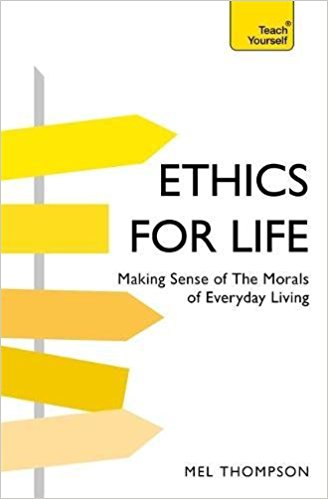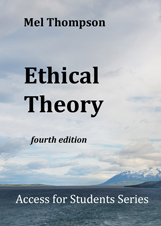This page is about Ethics for Life, published in the Teach Yourself series. For general material on ethics and notes on ethical theories, please go to the Ethics page by clicking here.
 Ethics for Life
Ethics for Life
This is ethics with a personal twist. Its aim is to explore the moral issues and arguments that direct our lives, express our values, and shape our future.
This is the 6th edition of my original 'Teach Yourself Ethics' book, now with additional sections to bring issues up-to-date and aimed at bringing out the personal relevance of a study of ethics.
If you buy direct from Amazon using these links, you will be supporting this website at no cost to yourself. Click here to buy from Amazon in the UK. / or here from Amazon.com
Reviews of the earlier edition on Amazon include the following...
'As I started reading and taking notes, I discovered that it really is a helpful guide to morals and ethics! Well-written and easy to understand, this book gets to the point and will really get you thinking. HIGHLY recommended for any beginning students of philosophy.'
'This is the best book I've read on the subject. Its very clearly written, it explains the views of all the relevant people and gives practical examples along the way. So this is a recommendation, and it also applies to "Teach Yourself Philosophy" by the same author.'
From the Introduction...
In personal terms, the study of ethics can offer two things. Firstly, it can help us appreciate the moral choices that people make, and the justification they give for them. Secondly, it involves a reflective sharpening of our own moral awareness – a conscious examination of the values and principles by which we choose to live, how these have influenced the decisions we have taken, and (more importantly) the part that moral choice plays in shaping our own future and that of the world around us. To think ethically is to take conscious control of our lives, rather than drifting with social fashion or blindly following what other people tell us.
As we look at ‘Ethics for life’, our motto should be ‘Take back control!’
‘What should I do?’
‘How do I know what is right?’
These basic questions are the starting point for ethical debate, for ethics is about moral choices, the values that lie behind them, the reasons people give for them and the language they use to describe them. It is about innocence and guilt, right and wrong, and what it means to live a good or bad life. It is about the dilemmas of life, death, sex, violence and money. It explores human virtues and vices, rights and duties.
Key idea for life…
If you hope this book will provide you with a handy guide for deciding life’s issues and relieve you of difficult decisions, forget it! Such a book does not exist, and if you find one that claims to do so, be on your guard; the author probably has an agenda to push or a lifestyle to sell. All a book can do is introduce you to ideas that may help you to think through issues that face you and to accept ownership of the decisions you take.
To be interested in ethics is to be interested in life! Each day we are bombarded with news of personal choices and their consequences, from the sexual proclivities of the famous to the violence and tragedy of war, and from the sight of those who are starving in an otherwise prosperous world to the casual vandalism and petty crime of inner city streets. The explanations given for these things may vary, from elaborate justifications in terms of a political or economic ideology, to the general complaint that traditional values have vanished. We cannot escape from moral issues, even if we are lucky enough to find that our own lives are untouched by painful decisions or tinges of guilt.
In this respect, babies are lucky. They feel hungry, or dirty, or wet, and just scream until someone figures out what is wrong and gives them what they need. They do not have the intellectual ability to question how they got into their particular mess, or the steps they need to take to get out of it. They are not morally responsible. But it is not long before the toddler will complain “That’s not fair!” and he or she will have started to do ethics.
No rational human being can escape moral responsibility, for refusing to even consider whether something is right or wrong is itself a moral choice; only infants, psychopaths and the unconscious are beyond considering such things. For the rest of us, ethics is about life and what we should make of it.
 If you are studying ethics, you may also be interested in this basic textbook...
If you are studying ethics, you may also be interested in this basic textbook...
You'll find plenty of additional material on ethics on the Notes for Students page, with topics including:
Kant's theory; Utilitarianism; Natural Law; Meta ethics
